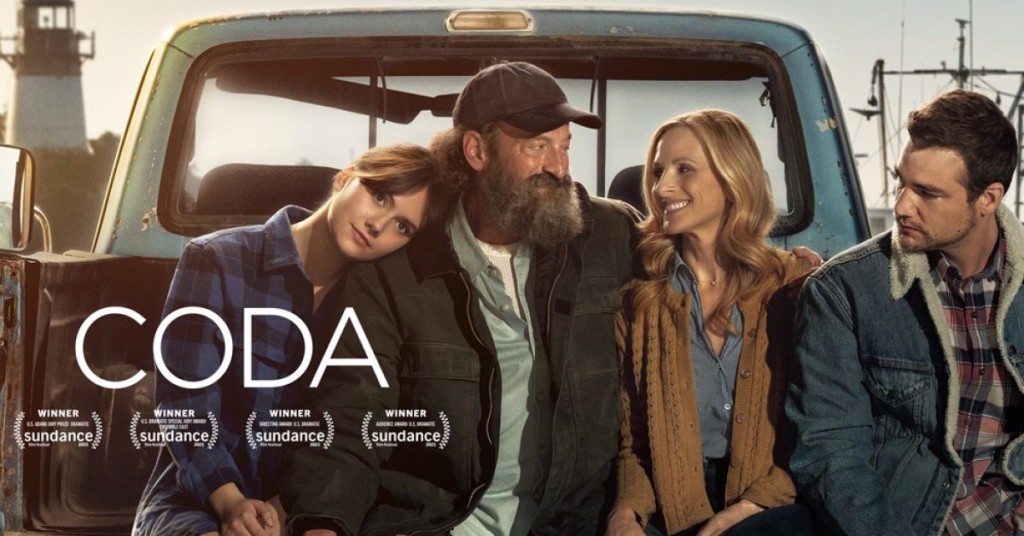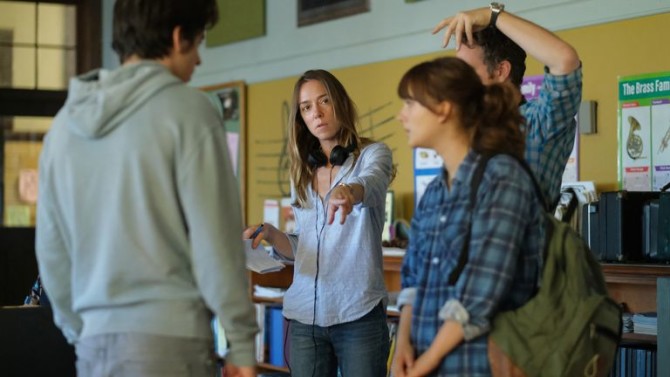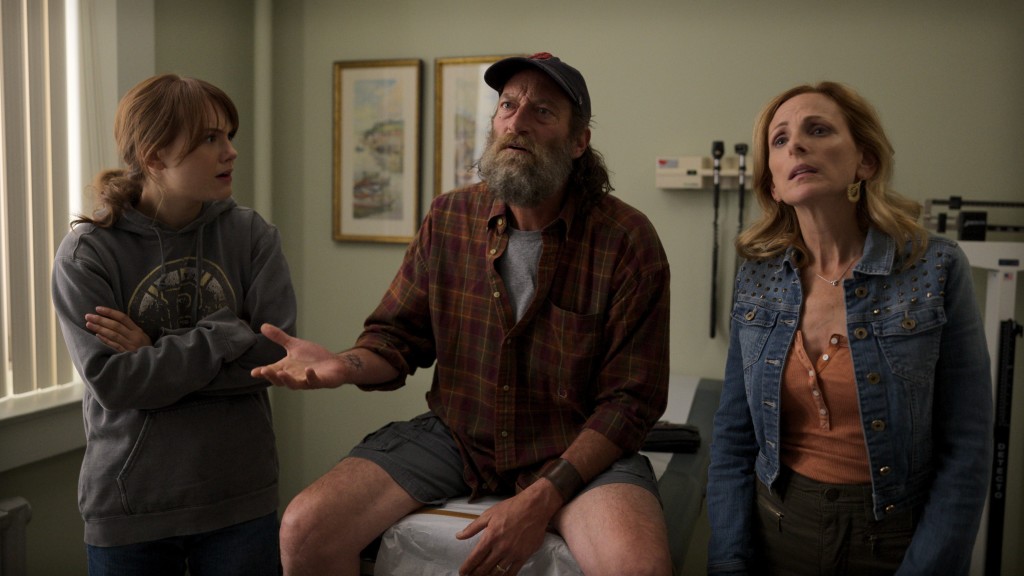We’ve got the Sundance grand prize winner here! Is it, like Rolling Stone claims, “every single Sundance movie rolled into one?”
Genre: Drama
Premise: A high school girl with dreams of becoming a singer is held back by her deaf family, who desperately need her help in order to succeed in their new fishing business.
About: Writer-director Sian Heder was approached by Lionsgate to remake Coda, which was originally a French film. They developed it through Lionsgate but, ultimately, the studio (which isn’t known for films like Coda so I don’t know why anyone thought it’d get greenlit in the first place) decided to pass. The producers then put the financing together independently, got the film made on their own, and, after it debuted at Sundance, Tim Cook bought the film for 25 million dollars for his Apple streaming service.
Writer: Sian Heder (based on the French film, The Belier Family written by Victoria Bedos, Stanislas Carré de Malberg, Éric Lartigau, and Thomas Bidegain.
Details: 110 minutes
Every writer needs to establish a modus operandi.
They need to have a writing rule-set to operate by. Mine is: simple story complex characters. 99 times out of 100, when a story gets too complicated or tries to do too much, it falls apart. Which was my big issue when I saw that Coda won Sundance. You have commercial fishing. You have a deaf family. You have a girl who wants to be the next American Idol. At first glance, there’s too much going on here.
That’s where my skepticism was born. But, believe it or not, I want to be proven wrong. When something proves me wrong, that means there’s something to learn. What did they do to navigate this pitfall? What can I learn that’ll help me expand my knowledge of storytelling?
Let’s see if I even need to worry about that with Coda…
Coda (which stands for “Child of Deaf Adults”) takes place in Good Will Hunting land, aka Boston. Frank and Jackie Rossie are deaf parents who own a fishing boat. Their two children are 20-something Leo, who’s also deaf, and our main character, 17 year old Ruby, who’s the lone member of the family who can hear.
Because Ruby can hear, she’s tasked with keeping the family business together. You’re not allowed to commercially fish with an all deaf crew. You need at least one person who can hear. Because the family is barely scraping by financially, they have no choice but to employ Ruby.
But Ruby has big dreams. It being her last year of high school, she signs up for choir class, as she’s always wanted to sing. When it turns out she’s good, her teacher, Bernardo, encourages her to try out for a music scholarship. Ruby never even thought about college as she figured she’d be working with her family forever. But she decides to give it a shot.
The family, meanwhile, gets tired of being taken advantage of in the fish market and decides to start their own company where they keep all the profits. Of course, in order for this to work, they’re going to need Ruby to handle all of the ‘hearing’ related stuff, which is a lot. For example, in order to get some exposure, they do an interview for the local news. Guess who has to be there to translate?
Ultimately, we know where this is going. Ruby is going to stick around for her family. Not because she wants to. But because she has to. That is, unless, her parents realize how important it is to let their daughter live her own life. Will they come around?
Okay, let’s make one thing clear. The rumors you heard about the echoes of a man sobbing relentlessly in Hollywood are NOT TRUE. I know there were Youtube videos posted. I know the local news nicknamed this handsome gentleman – not that anybody saw him, I’m just assuming he’s handsome – “The Sacred Sobber” – but whatever you heard about this rumor, it is not true, okay? So stop accusing me of wasting an entire box of tissues while I watched Coda. It’s fake news.
Now that we’ve gotten that out of the way.
Here’s the thing with Coda. It *is* messy. And it *is* trying to do too much. And not everything fits together perfectly. But it still somehow works. I think I’ll chalk it up to, the best movies are imperfect. It’s their strange concoction of ingredients that make them so memorable. Coda falls squarely into that category.
I also think there are certain movies that weren’t meant to be distilled into a logline or even a trailer. You don’t understand them until you’re living inside the context of the movie itself. When I saw the trailer, the fishing and singing stuff didn’t go together at all.
But in the movie, they do a good job of establishing the fishing stuff as the family’s livelihood. It’s very realistic. We see their job in intimate detail. So we buy into that world. It *is* a little jarring when Ruby, out of nowhere, says, “I want to be a singer now.” But just like the fishing stuff, we get into the details of her teacher coaching her and her practicing her duet with another boy in class – and that world gets established as well.
You sort of realize that that’s the point. This singing world is an escape for her. So it has to be different from the fishing world. Cause that’s why she’s doing it. It’s almost like her “Matrix.”
But where the movie really excels is when we realize that Ruby is going to have to choose between family or herself. This is one of the most universal themes you’ll see. It’s a story as old as time. And, for that reason, it’s a powerful story. Every good story should, at some point, give your hero an impossible choice to make. And by “impossible” I mean a choice that seems so difficult that even the audience is unsure what the character will do.
Coda does a great job of upping the stakes for the family so they don’t just kind of need Ruby. They REALLY need Ruby. For starters, they begin their own business which is impossible to run without a hearing person involved. And then they get caught fishing one day without a hearing person on the boat. They’re told that if you don’t have a hearing person on the boat moving forward, you’ll never be able to fish again.
Talk about STAKES! The consequences are dire for the family if Ruby decides to leave. All of that creates a ton of suspense as we wonder what Ruby is going to do. It’s great.
There’s one other thing I want to point out with Coda and it regards “showing not telling.” Coda has a series of three scenes that exemplify the power of “show don’t tell.” When you’re a new screenwriter who’s trying to understand why this is important, remember that when you cover major character moments through dialogue only, you risk them feeling on-the-nose or melodramatic. So you want to look for “show” options instead.
**SPOILERS FOR LAST ACT**
One of the primary unresolved conflicts in Coda is between Ruby and her father, Frank. Frank doesn’t understand all this singing nonsense. And, even if he did, it wouldn’t matter because he can’t hear Ruby sing. So he doesn’t even know if she’s good or not. Therefore, one of Ruby’s major roadblocks in chasing her dream is winning over her father. There are three scenes that show his transformation from “non-believer” to “believer” and all of them are show-don’t-tell.
The first occurs when the choir class puts on a show at the school auditorium. Ruby’s family comes but, of course, they can’t hear anything. So they’re sort of bored and signing to each other during the show. “What should we have for dinner later?” That sort of thing.
Then, at the end of the show, Ruby has a solo. During the solo, for the first time in the movie, the camera takes the POV of the deaf family, specifically Frank. So we’re hearing what they’re hearing, which is nothing. While this is happening, Frank starts to look around, and he notices how everyone is reacting to his daughter singing. Some are smiling. Others are crying. Others are moving to the music. It’s the first moment where he sees what his daughter’s singing is doing to people.
Frank is now conflicted. Is he holding his daughter back by keeping her in the family business? When they get back home that night, Frank calls his daughter over and asks her to sing the song again. But this time, since he’s next to her, he can place his hands on her vocal cords and “listen.” It’s through this experience that he becomes even more convinced of her talent.
This leads to the third and final scene, when Ruby does her audition for music school. It’s a closed auditorium so her family is forced to sneak into the upper deck. While singing the song, Ruby notices her parents, and begins to sign the song as he she sings it so they’ll understand it. It’s in that moment that Frank finally realizes that he can’t hold his daughter back. And so, even though she’s chosen to stay with the family at that point, he insists that she go to music school.
Three MAJOR story beats. All conveyed through SHOWING not TELLING. That’s how to screenwrite, people!
I don’t think Coda will be for everyone. I admit that it tries to hit those heartstrings a little too aggressively at times. But it’s so well done that it works (in my opinion). You love these characters. And that’s another feather in the movie’s cap. No character is left behind on the development front. Every single character gets their own storyline, their own arc.
Finally, it’s just nice to get a drama that’s going to be pushed at the Oscars without a single political agenda on its docket. All this movie cares about is entertaining and emotionally resonating with people. On that end, it does a tremendous job. Coda will definitely be a Top 10 movie of the year for me.
[ ] What the hell did I just watch?
[ ] wasn’t for me
[ ] worth the stream
[x] impressive
[ ] genius
What I learned: You want to feature scenes unique to your premise. Every concept should be original enough that you can write scenes that nobody else can write – because they’re specific to your setup. You have a movie about a deaf family. You BETTER THEN GIVE US SCENES ABOUT A DEAF FAMILY THAT WE CAN’T GET IN ANY OTHER MOVIE. Or else what’s the point of even writing the movie? One of the early scenes has both Frank and Jackie go to the doctor because they both have, um, itching in a sensitive area. The doctor doesn’t sign. So guess who has to come and translate? You got it, their 17 year old daughter! The scene that follows is both uncomfortable and funny.




